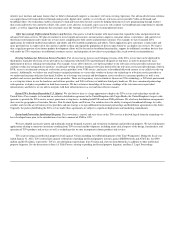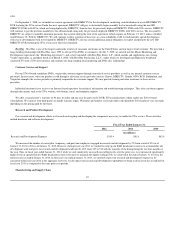TiVo 2011 Annual Report Download - page 19
Download and view the complete annual report
Please find page 19 of the 2011 TiVo annual report below. You can navigate through the pages in the report by either clicking on the pages listed below, or by using the keyword search tool below to find specific information within the annual report.
Table of Contents
manage, estimate, and perform these development and engineering services for our television service provider customers could cause us to incur unexpected
losses and reduce or even eliminate any profit from these arrangements, and in such a case our business would be harmed.
Many of our current deployment arrangements with television service providers require us to incur significant upfront development and engineering
expenses for which we are in total or in part compensated through service fees received after a solution is launched. If we are required to incur such
upfront development and integration costs in excess of any development revenues and we are reasonably assured that these excess upfront development costs
are recoverable, we will defer such cost and recognize them on a zero margin or straight-line basis after the solution is launched. However, despite the deferral
of these development costs, we do incur cash outflows associated with these development efforts resulting in potentially higher cash usage in the near term. In
situations where we are recovering upfront project-specific development costs, we would start recognizing service revenues (and related margin) only after the
initial project-specific development costs are fully recovered. As of January 31, 2012, we had approximately $18.4 million in such project-specific deferred
costs. The assessment of recoverability is highly dependent on our estimates of engineering and operating costs related to the project. As a consequence, it
may be a significant period of time after a solution launches and after we are adding new subscriptions from such deployment arrangement before we
experience a corresponding impact on our service revenues (and related margins) from such a deployment arrangement. If we fail to properly estimate,
manage, and perform these development and engineering services and otherwise comply with the terms of these deployment arrangements, we could incur
additional unexpected expenses and losses in connection with these arrangements.
In the event of an early termination of these arrangements with our television service provider customers prior to deployment, we would be forced to
recognize any deferred development costs which we have incurred but not recognized without corresponding revenues from development or subscription
fees, in such an event we would be forced to incur unexpected losses. From time to time during development and integration for our television service
provider customers, we or our customers may request to revise certain terms of our contracts or statements of work to modify such deliverables required or to
otherwise address circumstances and technological requirements not anticipated by the parties when the contract or statement of work was originally agreed
upon. Additionally, from time to time, we have and may in the future experience delays in our development work with our television service provider
customers like ONO and Charter, which may cause us to modify the terms of those arrangements in the future. If we were to fail in modifying the terms of
these arrangements to the satisfaction of both parties and the arrangements were unexpectedly terminated early, we would have to recognize immediately any
associated deferred costs that may no longer be deemed recoverable. In such an event that we would have to recognize early such deferred development and
integration costs, we would be required to do so without any corresponding revenue in which case we would incur unexpected losses which would harm our
business.
Our success depends on our ability to secure and protect our patents, trademarks, and other proprietary rights.
Our success and ability to compete are substantially dependent upon our internally developed technology. We rely on patent, trademark and copyright
law, trade secret protection, as well as confidentiality and license agreements with our employees, customers, partners, and others to protect our intellectual
property rights. However, the steps we take to protect our proprietary rights may be inadequate. We have filed patent applications and provisional patent
applications covering much of the unique technology used to deliver the TiVo service and its features and functionality. To date, several of these patents have
been granted, but we cannot assure you that any additional patents will ever be granted, that any issued patents will protect our intellectual property or that
third-parties will not challenge any issued patents. For example, several of our European patents, including foreign counterparts of our Time Warp patent, are
the subject of proceedings before the opposition division of the European Patent Office. Opposition proceedings may result in changes to certain claims or
revocation of a patent. In addition, other parties may independently develop similar or competing technologies that design around any patents that may be
issued to us. Our failure to secure and protect our proprietary rights could have a material adverse effect on our business.
We generate a significant amount of revenue from our patent settlement agreements with DISH and AT&T which expire in calendar year 2018,
and if we are unable to renew or replace these revenues, our business could be harmed.
In fiscal year 2012, we entered into patent settlement agreements with DISH and AT&T which will pay us recurring revenues until 2018. We generate a
significant amount of revenues as a result from these settlement agreements. If we are unable to renew or replace these revenues through similar or other
business arrangements,
18
























